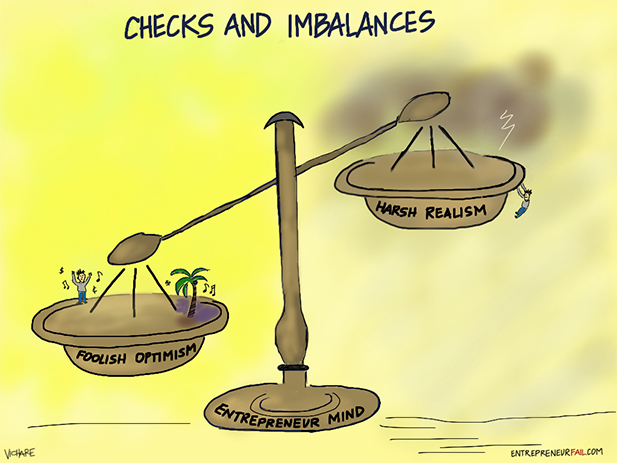The entrepreneurial mind often skews to idealism.
Pull out those rose-colored glasses. Optimism signals confidence, abilities, perseverance and positive outcomes. These are clearly the traits startup founders need to get their first customers, funding or boost employee morale. Also, in some situations, confidence even trumps accuracy. Sounds great doesn’t it? I can almost hear the applause for the aspiring “wantrepreneurs” out there.
Often someone who is harshly realistic suppresses the effort to realize a lofty goal, compared to someone who is foolishly optimistic. Take this example:
The optimistic entrepreneur (as foolish as they may be) may aspire to have the highest revenue of any company in his industry this year.
And the realistic entrepreneur, on the other hand will hope to barely break even this year.
Guess what – the ridiculous optimist, while he/she may not reach the intended goal, he/she will probably achieve more than the realist, because he/she won’t limit himself in efforts when close to breaking even.
But wait…
Consider the flip side though: there are two potential problems with having too much optimism. When harsh reality does kick in, the idealistic entrepreneur may not even realize it, or casually brush the truth aside, thus ignoring signs of potential failure. Secondly, there is such a thing as too much optimism when dealing with stakeholders. Potential customers and VCs can see right through that. The only person you are fooling is you! This is an avoidable #entrepreneurfail, so be aware.
So, what should you do?
Firstly, you may have heard of Jim Collins’ BHAG (big hairy audacious goal). Create a BHAG as soon as you start your company and tweak as necessary. And then find a mentor, advisor or a board of directors who will push you to do your best, yet keep you grounded in reality.
So where does your scale tilt? Foolish optimist or harsh realist? Why? Tell us about it in the comments below. Read more at #entrepreneurfail







